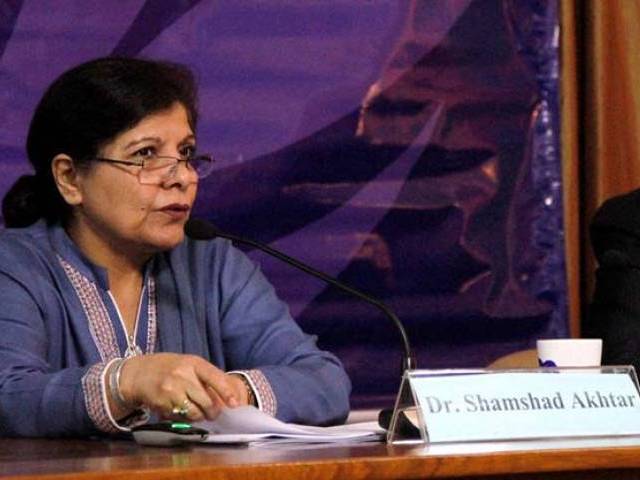
ISLAMABAD: Caretaker finance minister, Dr Shamshad Akhtar on Friday requested the Asia Pacific Group (APG) on Money Laundering to be accommodating in its deadline provided to Pakistan for fixing legal and administrative flaws in Anti Money Laundering (AML) and Counter-Terrorism Financing (CTF) frameworks.
The interim finance minister asked the APG delegation about giving Pakistani authorities a full opportunity to provide necessary materials and reports to them during a meeting held on Friday, reports Express Tribune.
The visit of the APG team came at a time when a caretaker government is in place and the victorious party Pakistan Tehreek-e-Insaaf is on the cusp of taking reins of the government.
APG delegation’s next visit is scheduled for October and would provide very little time for the incoming PTI government to meet the deadlines for enacting new laws.
The meeting of the APG delegation with Ms Akhtar wasn’t scheduled, however, it was setup at the last leg of their visit.
A six-member visiting delegation of the Asia Pacific Group (APG) found some deficiencies in Pakistan’s systems, agencies, and laws to meet its global obligations against money laundering and terror financing but noted that progress was taking place.
In the concluding session with host authorities, the delegation pointed out deficiencies in legal mechanisms governing non-profit and charitable organizations, transparency in beneficial ownership regime and counter-terror financing mechanisms to handle suspicious transaction reports (STRs). The APG will submit its report to the Paris-based Financial Action Task Force (FATF).
Both the government and the APG did not issue any statement at the end of the three-day talks that ended on Aug 16, while the authorities involved in the negotiations declined to speak on the record.
The delegation told the authorities that legal framework covering the non-profit and charitable organizations was seriously deficient and vulnerable to leaks and misuse, while the beneficial ownership regime did not meet transparency standards and benami ownerships were still widespread.
Also, the Financial Monitoring Unit (FMU), National Counter Terrorism Authority (Nacta) and provincial agencies like police required a lot of training and preparedness to combat money laundering and terror financing to the satisfaction of the FATF under a 10-point action plan committed by Pakistan.
The authorities told the APG that focal persons had been appointed at all levels for inter-agency and inter-provincial coordination and the regulators. It was, however, noted that some of the shortcomings in policymaking and legal arrangements stemmed from inherent limitations of a caretaker set-up and political transition.
Therefore, another review will now take place next month, i.e. September, to engage with the new PTI coalition government as well as provincial governments for an effective push. This would be followed by yet another visit by the APG in October.
The delegation also told the authorities to upgrade agencies and their human resources to be able to handle foreign requests to block terror financing and freeze illegal and targeted assets. It also advised strengthening of mutual legal assistance laws for the extradition of those involved in terror financing and money laundering on requests from FATF-member countries.
According to a source, Pakistan lacked mutual legal assistance arrangements with a number of countries. “It was noted that there was a long way to go in terms of training officials of various agencies, strengthening of systems and processes and improving laws,” said an official who was part of the four-day consultations.
A number of Pakistani agencies were part of the dialogue with the delegation and, among others, including officials of the ministries of interior, law, finance and foreign affairs, besides State Bank of Pakistan, FMU, Nacta, FIA, FBR, SECP, etc.
The FMU played a coordinating role with other agencies in formulating a consolidated progress report submitted to the APG delegation which consisted of members from Turkey, China, the UK and the US. The next session with the APG will take place by mid-September to examine progress on the FATF action plan.
By the end of September next year, Pakistan has to comply with the 10-point action plan it committed with the FATF in June this year to combat terror financing and money laundering to get out of the greylist. Failure of implementation could mean falling into the blacklist.






















